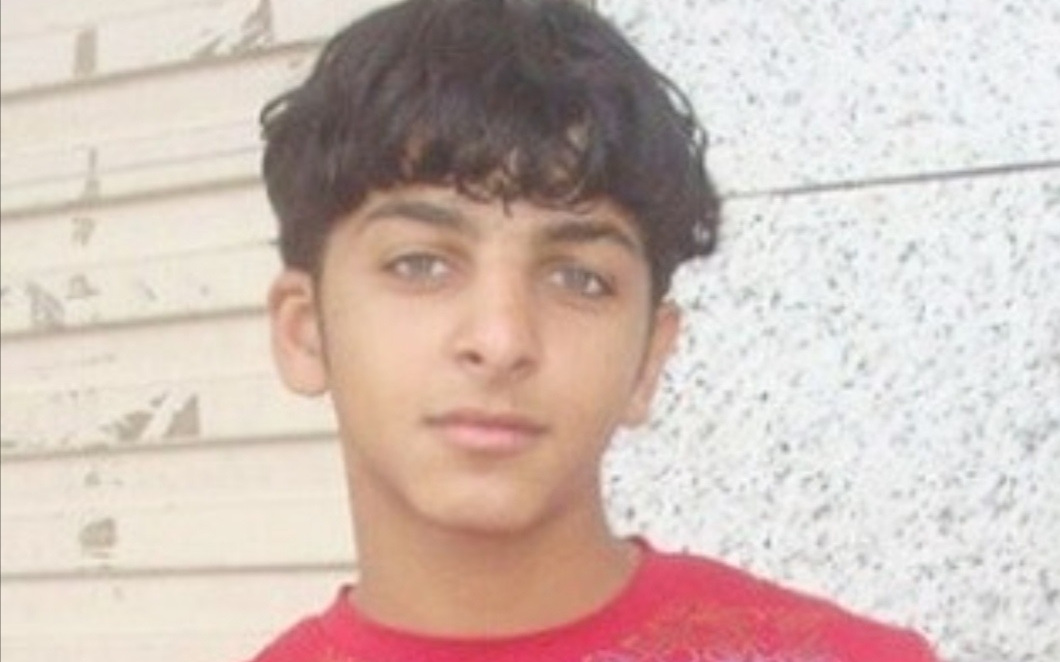Ali Mahdi Alaiwi was a 17-year-old Bahraini student when he was arrested without a warrant and subjected to an unfair trial. Ali is currently incarcerated in Jau Prison, where he has recently suffered from ill health.
On 22 May 2013, regular police officers and riot police, as well as officers in plain clothing and masks, forcibly entered Ali’s home at dawn, while the residents of the house were asleep, and arrested Ali without presenting a warrant or mentioning the reason for the arrest.
The officers stated that they would take Ali for interrogation, and if there were no charges against him, they would return him home. However, after the arrest, officers disappeared Ali for a period of time, during which they interrogated him at the Criminal Investigation Directorate (CID) and then transferred him to Dry Dock Detention Center. The court appointed him a lawyer; however the court prevented the lawyer from communicating with Ali, and the lawyer did not attend his interrogation.
Initially, Ali was only charged with arson. However, after a long period of detention, he received summonses for other charges: arson, illegal assembly and riots, burning tires, and assault on a security officer. On 1 April 2014, Ali was sentenced to three years’ imprisonment for each of the first three cases (arson, illegal assembly, and burning tires), and one year in the assault case, for a total of 10 years in prison. On 2 April 2014, he was transferred to Jau Central Prison, where he was held with other minors. On 28 September 2014, the Court of Appeal upheld the sentence on the arson and illegal assembly charges.
After the events at Jau Prison in March 2015, in which Bahraini security forces tear-gassed and beat inmates at the prison while trying to quell clashes that erupted during family visits and subjected prisoners to collective punishment, Ali was transferred to New Dry Dock, the section of Jau Prison for individuals under the age of 21, and remained there for almost two years. After reaching the age of 21, he was transferred to the general prison population. He was recently held incommunicado for about four weeks, from late January to 27 February 2019.
Ali’s family reports that he is currently “psychologically tired.” He has become short-tempered, yells for no reason, quarrels with his cell-mates, and HAS recently refused family visits. They also report that he suffers from hallucinations and may be suffering from Trichotillomania, as he is shaving his eyebrows and plucking his eyelashes. Ali did not have any medical conditions before entering prison.
On 24 February 2019, the family filed a complaint with the Ministry of Interior Ombudsman, in which they asked for Ali to be examined by a specialized psychological doctor or a neurologist because of the anxiety he had recently suffered, as well as his deteriorating mental state. Ali suffered previously from a headache and a nosebleed and did not accept medication from the prison administration. Around 26 March 2019, the family’s lawyer submitted a letter to the public prosecutor calling for Alaiwi to be presented to a psychologist. On 8 April 2019, the lawyer received the acceptance. However, as of May 2019, the prison authorities have taken no action to allow for Ali to be seen by a mental health professional.
On 14 March 2019, the family submitted a complaint to the National Institution for Human Rights (NIHR) regarding the conditions of Ali’s detention. On the same day, the family had a visit scheduled with Ali, however, the prison administration told them that he is denied from receiving visits due to a dispute with a guard and because of his quarrel with one of the other prisoners. On 22 April 2019, the NIHR informed Ali’s mother that the request of presenting Ali to a psychiatrist was accepted, but they did not give her a specific date for an appointment.
Bahrain’s ill treatment and unfair trial of Ali are in violation of his fundamental human rights and Bahrain’s international and domestic obligations. In this case, as in others, the Bahraini government did not fulfill its obligations under the international treaties to which it is party, including the International Covenant on Civil and Political Rights and International Covenant on Economic Social and Cultural Rights. In light of this, Americans for Democracy & Human Rights in Bahrain (ADHRB) calls for Ali’s release with redress for past suffering and, if serious criminal charges can be sustained against him, for a fair trial conducted under universally agreed juridical standards and open to international monitoring and evaluation. ADHRB also calls for the prison administration to allow for appropriate medical and psychiatric care for Ali, and for all prisoners within its care.





